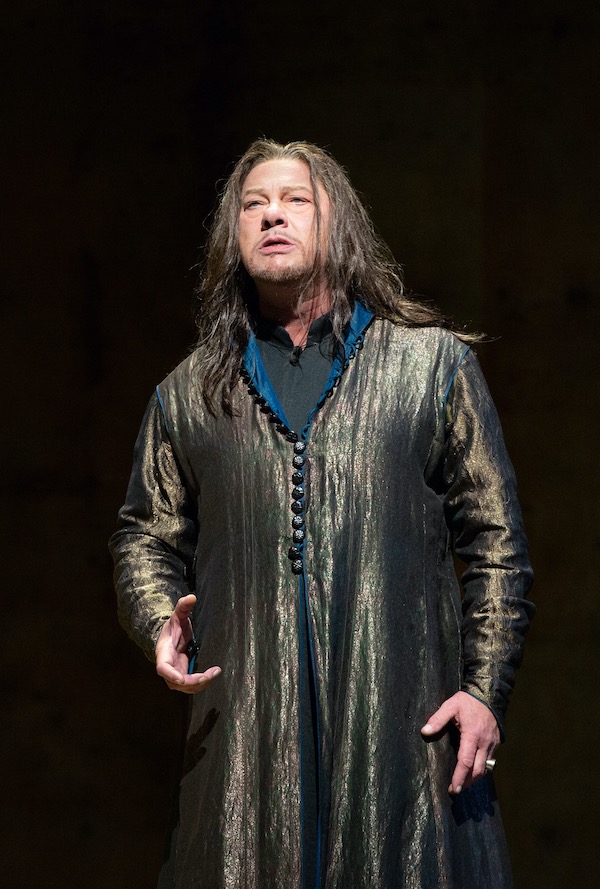A fine cast provides bright moments in Met’s dark-hued “Boris”

Mussorgsky’s Boris Godunov opened Tuesday night at the Metropolitan Opera House, with bass René Pape in the title role.
The opera is familiar, a staple repertory piece in the opera world—Tuesday was the 274th performance at the Met—and a vehicle for the most talented and commanding bass singers, like Pape. But there’s a particular sense of occasion around this production, as the Met is, for the first time in the house’s history, presenting the original 1869 version of the score.
The staging is a revival of Stephen Wadsworth’s 2010 production—well made on its own terms and an effective complement to the musical and dramatic darkness of Mussorgsky’s score. The common colors are the golds, reds, and yellows of Russian iconography, and inside the darkened theater the scheme is not just lovely but has a peaceful, timeless effect, like visual incense.
This is a period production on modern lines, sleek but meant to feel as if everything is taking place around the turn of the 17th century. The good qualities, the sumptuous tableaux with the stage packed with principals, chorus, and supernumeraries who visually represent the multiple layers of Russian society, exacerbate the problems in the original 1869 score and the dramatic structure.
The opera’s story is adapted from Alexander Pushkin’s play of the same title. The stage work is culturally specific to a country that was attuned to a dynastic monarchy as not only the acceptable status quo of governance and social organization, but had a quasi-mystical yearning for a ruling figure who connected God to the country and vice versa. Mussorgsky chopped up the play into seven scenes, a disjointed formal approach that seeks to convey drama and meaning through emotional impressions. The title character is always on the knife’s edge of stability, flanked by guilt over the murder of the preceding tsarevich, Dmitry (Ivan the Terrible’s son), and his self-image as a stern but benevolent ruler.
Pape is the leading interpreter of this role on the scene, and he integrated his singing and his body language, a centered voice and frantic movements, into a compelling performance that created the sense of fateful tragedy. Yet fine as he was, the German bass could not quite bridge the gaps in this version of the score, which gives only Godunov’s vague sense of guilt. One could see what the emotions might be without feeling their resonance.
This is one of the problems with the 1869 version, which is shorter than the composer’s later, and better known, revision. The set pieces don’t come together into an effective whole, there are gaps. There are so many evocative melodies in the score, and overall a powerful feeling, via the rhythms and harmonies, that things are always slipping away, just out of reach, but the effect is often lost in the face of a disjointed juxtaposition.
Tenor Miles Mykkanen sang the Holy Fool, who expresses a piece of Russian culture. In his house debut tenor Maxim Paster was a bright spot as the scheming Prince Shuisky. Another tenor making his Met debut, David Butt Philip, was a mellifluous Grigory.
This version is also unremittingly dark with low male voices dominant. Combine that with orchestration that emphasizes lower strings and brass, and bassoons, and the psychological murkiness of the drama made for an unremittingly monochrome darkness.
Besides the chorus, the only women’s voices heard Tuesday were those of soprano Erika Baikoff, in her Met debut, and mezzo Megan Marino (in the small roles of Godunov’s daughter and son, Xenia and Feodor), and mezzo Eve Gigliotti (in the even smaller role of the Nurse).
Some tonal contrast came from the choral parts, which are full of energy, and the Met chorus was spectacular in these passages, singing with a force to drown out the orchestra.
Working with what Mussorgsky created, these principal performances were strong throughout. Pape was equalled and complemented by Ain Anger as Pimen and bass-baritone Ryan Speedo Green as Varlaam. Without slowing down the flow from conductor Sebastian Weigle and the orchestra, Anger’s phrasing made every line sound like a contemplative moment, something to savor at one’s leisure.
Singing the drunken monk, Varlaam, Green stole the show. He was boisterous, social, and also both comical and deadly serious when the character struggles to read an arrest warrant that names Grigory (who has tried to convince the illiterate police that it’s Varlaam they want).
That was a tour de force in a scene that was otherwise, in this score, dramatically nonsensical. It encapsulated the qualities of this production, which was performed at an extremely high level and gorgeous visually, but in a version that still doesn’t shed light on the viscera of Mussorgsky’s opera.
Boris Godunov runs through October 17. metopera.org